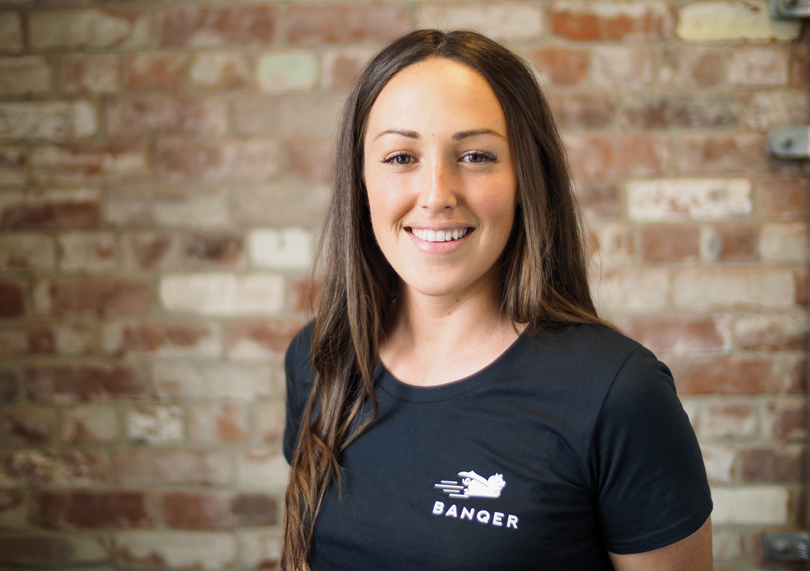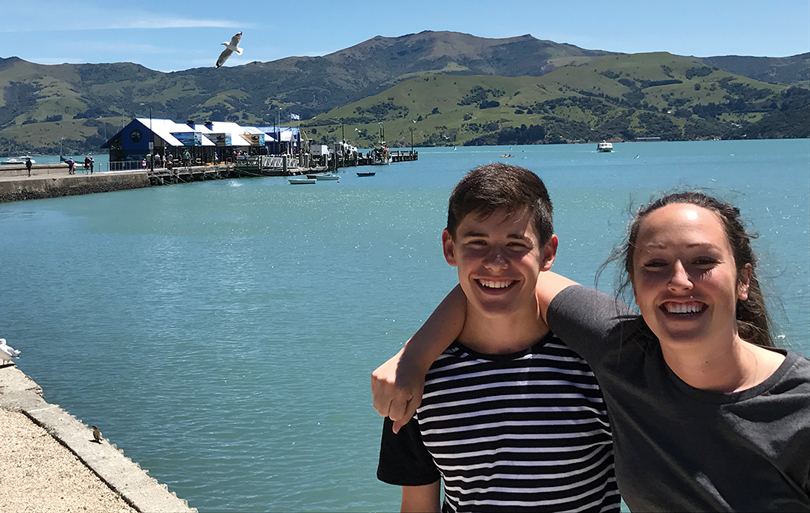Kendall Flutey Tech entrepreneur
Oct 3, 2018

She was going to be an accountant … and then she wasn’t. Now Kendall Flutey (Ngāi Tahu) is a tech entrepreneur, and is being heralded as a young Māori business leader.
Nā Mark Revington.

“I’ve had a few careers that didn’t stick,” she says from a meeting room at GreenHouse, a Christchurch business incubator. Banqer, the company she co-founded and is now the CEO, uses a nearby co-working space in the Christchurch CBD.
On Twitter, Kendall calls herself “a reformed accountant on a mission”. That mission is educating Kiwi kids about finance. Her product, Banqer, is an online tool for primary and intermediate schools (years 2 to 8) to teach students about money. Earlier this year Kendall was named Young Māori Business Leader of the Year at the University of Auckland Aotearoa Māori Business Leaders Awards.
Banqer was launched in January 2015, after the concept was developed at a Startup Weekend. Kendall had completed a Bachelor of Commerce, majoring in accounting and economics, and was just weeks into her first corporate job at KPMG when she realised it wasn’t what she wanted to do. “The third week in, I thought, ‘No, this is not for me.’ I absolutely didn’t like the corporate life. It definitely wasn’t my calling.” She stuck it out for six months, and then took a risk by pivoting into the IT industry.
Kendall enrolled in Enspiral Dev Academy’s inaugural boot camp course, to learn how to code web applications. She loved it.
“It was awesome,” she says. “They get you so practically ready. It was just the sort of learning I needed. It was very different to going to uni but I preferred it. It is so relevant and so engaging and they are just really good people.”
Kendall had found her calling. That background in accountancy certainly comes in handy in business, although life as a web developer and tech entrepreneur is much more satisfying, she says. She has since admitted that she completed her degree because at that time she wasn’t brave enough to follow her heart into web development.
Banqer’s genesis lay in a conversation she had with her younger brother.
“I came home to Christchurch and it was my little brother who sort of sparked the inspiration for the idea. He’s a lot younger than me, and he was in primary school learning about money from his teacher, and had all these curly questions for me.
“He was asking me about companies and finances – you name it and this 12-year-old was asking – and I felt bad, as an ex-accountant who had always been interested in business. I had never chatted to him about money or anything like that, and here he was putting me to shame almost.

Above: Kendall Flutey and her younger brother Jordy Annand.
“So I was really curious about what was going on, and it turned out that his teacher was running a financial literacy programme in the classroom. I was so curious that I called his teacher the next day and we went for a coffee and chat about the programme he was running. He had made it up himself, and it was all paper-based. The kids all had ‘cash’ that he had printed out. I thought it was pretty cool that he had taken the time to do this. And my brother was benefiting.
“So between the two of us, me and the teacher – Micah Hocquard – we concocted the idea.” These days the pair are both involved with Banqer, with Hocquard as pedagogy lead.
Kendall has Ngāi Tahu whakapapa through her father, Peter Flutey, who was brought up in Martinborough. Kendall was raised in Christchurch by her mother, Shelley Ann, and has spoken about the influence of watching her mother work hard to raise two children as a solo mother. It instilled in her an appreciation of the value of money, she says.
Kendall says she is just embarking on the journey to discover more about her whakapapa. “I think I just had to reach the stage of my life where I was ready to take that journey, and so far everyone has been really supportive – even though I have asked some dumb questions at times.”
And Banqer is about to release a te reo Māori version, with the help of Vini Olsen-Reeder, a lecturer at Victoria University’s Te Kawa a Māui, or School of Māori Studies.
No two days are the same, and a large part of running Banqer involves talking to people: colleagues, teachers, students, partners, politicians, parents – the list seems endless, Kendall says. She might be talking to school students one minute, and then partners or potential partners. These days, Kendall tends to focus more on strategic planning, product development, and presentations. Just last month, she appeared on a panel with Christchurch companies Māui Studios and Ariki Creative in a discussion about the future of Māori in tech.
“[Winning the title of Young Māori Business Leader of the Year] was a bit of a shock but really amazing, pretty special. It came at a time when I was on this personal journey around my whānau, so the validation around my identity was pretty special … It has made me even hungrier to dive into my whakapapa.”
“It took a while to find my feet and gain confidence,” she says. “I was always second-guessing myself and not trusting my instincts. I analysed that and I am working my way through it.
“Early on, I used to stress about talking to groups of people. I have become more self-assured.”
In other words, practice and persistence have paid off. Her greatest buzz? Talking to classrooms full of eager young students, of course. “Hands down, it is when I go into a class and listen to the kids. If I am having a stressful day I can drop into a school and feel much better.”
Does she have a five-year plan? Kendall laughs. No, life is moving too fast and anyway, that doesn’t really suit her. Banqer, however, has a five-year marketing vision that is constantly updated. “And we’ve got a lot of big, bold, crazy ideas – some of which have come to fruition.”
Unusually for a start-up, Banqer has never gone out and raised capital and there isn’t an exit strategy – both of which are usually text-book moves for a young company.
They haven’t needed to raise capital, says Kendall; and the founders believe in sustainable rather than exploitative growth. While Banqer is not a social enterprise as such, it is close to one in its scope. Theirs is a passion for giving students the keys to what was previously seen as an adult world – that of spreading financial literacy.
“We need business sustainability, but it doesn’t have to be 100 per cent capitalism all the time, squeezing a dollar out of every rock,” she says. “We are better than that; and I think once people realise that, we can unlock some pretty cool things. You need to make a living, but not some exploitative thing. I think people get lost in that journey.”
Winning the title of Young Māori Business Leader of the Year (sponsored by Ngāi Tahu Holdings) came as a nice surprise, she says; although the initial email arrived on April 1 so she thought it was an April Fool’s Day joke. The timing coincided with the beginning of her personal journey to explore her whakapapa.
“It was a bit of a shock but really amazing, pretty special. It came at a time when I was on this personal journey around my whānau, so the validation around my identity was pretty special. Obviously to kick my feet up for the night and recognise the work we have done was pretty cool, but that personal piece for me was really special. It has made me even hungrier to dive into my whakapapa.”
It is all part of a journey that Kendall describes as “pretty cool so far”. What is success? Not just dollars in a bank account, she says.